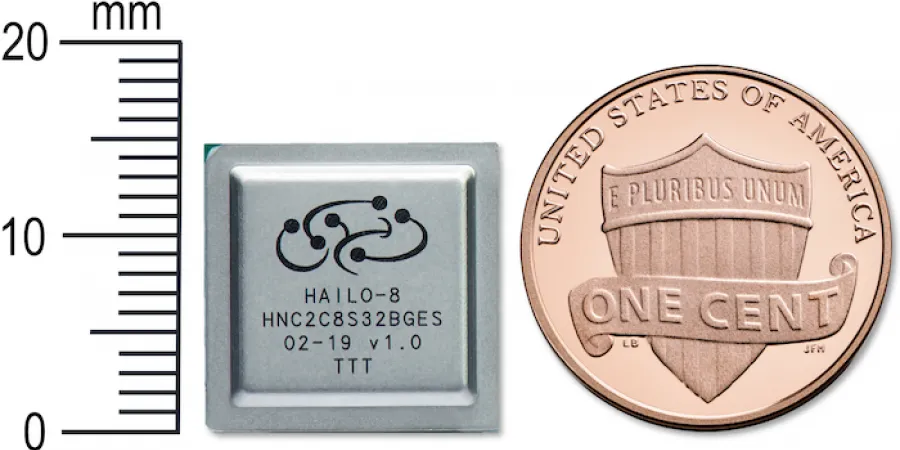Israeli AI Chipmaker Hailo Launches Deep Learning Processor
Ami Rojkes Dombe
| 20/05/2019
Israel-based AI chipmaker Hailo has released the Hailo-8TM, claimed to be the world’s top performing deep learning processor. The company said it is now sampling its newest chip with select partners across multiple industries, with a focus on automotive. The chip is built with an innovative architecture that enables edge devices to run sophisticated deep learning applications that could previously run only on the cloud, Hailo said in a release.
The Hailo-8 processor features up to 26 tera operations per second (TOPS). The company claims that new chip has area and power superior to other edge processors by an order of magnitude – at a size smaller than a penny, including the memory. By designing an architecture that relies on the core properties of neural networks, the chipmaker added, edge devices can now run deep learning applications at full scale more efficiently, effectively, and sustainably than traditional solutions, while significantly lowering costs.
Hailo says it is working with leading OEMs and tier-1 automotive companies in fields such as advanced driver-assistance systems (ADAS), as well as players in industries like smart cities and smart homes, to empower smarter edge and IoT devices. These industries often require the use of high-performance cameras to perform tasks such as semantic segmentation and object detection in real time – tasks which Hailo’s chip can perform at full resolution, while consuming only a few Watts. Hailo’s redesign eliminates untenable heat dissipation issues and removes the need for active cooling systems in the automotive industry. Its structure translates to higher performance, lower power, and minimal latency, enabling more privacy and better reliability for smart devices operating at the edge.
According to preliminary results comparing Hailo-8 to Nvidia's Xavier AGX, which runs NN benchmarks such as ResNet-50, Hailo-8 consumes almost 20 times less power while performing the same tasks.
“In recent years, we've witnessed an ever-growing list of applications unlocked by deep learning, which were made possible thanks to server-class GPUs,” said Orr Danon, CEO of Hailo. “However, as industries are increasingly powered and even upended by AI, there is a crucial need for an analogous architecture that replaces processors of the past, enabling deep learning to run devices at the edge. Hailo’s chip was designed from the ground up to do just that. We are excited to help customers drive their intelligent devices to new limits. A new age of chips means a new age of technology.”
Israel-based AI chipmaker Hailo has released the Hailo-8TM, claimed to be the world’s top performing deep learning processor. The company said it is now sampling its newest chip with select partners across multiple industries, with a focus on automotive. The chip is built with an innovative architecture that enables edge devices to run sophisticated deep learning applications that could previously run only on the cloud, Hailo said in a release.
The Hailo-8 processor features up to 26 tera operations per second (TOPS). The company claims that new chip has area and power superior to other edge processors by an order of magnitude – at a size smaller than a penny, including the memory. By designing an architecture that relies on the core properties of neural networks, the chipmaker added, edge devices can now run deep learning applications at full scale more efficiently, effectively, and sustainably than traditional solutions, while significantly lowering costs.
Hailo says it is working with leading OEMs and tier-1 automotive companies in fields such as advanced driver-assistance systems (ADAS), as well as players in industries like smart cities and smart homes, to empower smarter edge and IoT devices. These industries often require the use of high-performance cameras to perform tasks such as semantic segmentation and object detection in real time – tasks which Hailo’s chip can perform at full resolution, while consuming only a few Watts. Hailo’s redesign eliminates untenable heat dissipation issues and removes the need for active cooling systems in the automotive industry. Its structure translates to higher performance, lower power, and minimal latency, enabling more privacy and better reliability for smart devices operating at the edge.
According to preliminary results comparing Hailo-8 to Nvidia's Xavier AGX, which runs NN benchmarks such as ResNet-50, Hailo-8 consumes almost 20 times less power while performing the same tasks.
“In recent years, we've witnessed an ever-growing list of applications unlocked by deep learning, which were made possible thanks to server-class GPUs,” said Orr Danon, CEO of Hailo. “However, as industries are increasingly powered and even upended by AI, there is a crucial need for an analogous architecture that replaces processors of the past, enabling deep learning to run devices at the edge. Hailo’s chip was designed from the ground up to do just that. We are excited to help customers drive their intelligent devices to new limits. A new age of chips means a new age of technology.”



